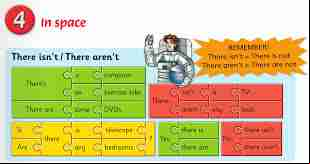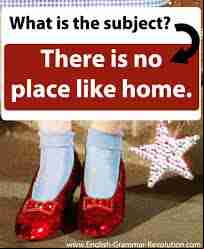 |
> Plus de cours & d'exercices d'anglais sur les mêmes thèmes : | Autres thèmes] |
| > Tests similaires : - Présent simple | |
| > Double-cliquez sur n'importe quel terme pour obtenir une traduction... |
There is /are et autres formes - cours d'anglais r4964
1) There is + singulier ; there are + pluriel = il y a ; la forme se contracte au singulier.
s251p
ex : There's a man => There are two men.
2) There + to be peut se conjuguer à tous les temps.


| There will be rain again tomorrow! | Il pleuvra encore demain ! |
| There would be problems if there was more rain ... | Il y aurait des problèmes s'il pleuvait encore. |
| There has been rain for days./ There had been ... | Il pleut depuis des jours... / Il pleuvait depuis... |
| There was rain yesterday. | Il a plu hier. |


3) Les formes interrogative et négative se forment simplement :
- Forme interrogative = inversion sujet /verbe : Will there be rain tomorrow? Y aura-t-il de la pluie demain ?
- Forme négative = ajout de 'not' : There won't be rain tomorrow. = il n'y aura pas de pluie demain.
4) There + to be peut être associé à un modal :


4) There + to be peut être associé à un modal :
| There can be a lot of rain in this area. | Il peut pleuvoir beaucoup dans cette région. |
| There may be .... | Il se peut qu'il y ait .... |
| There may have been .... | Il se peut qu'il y ait eu ... |
| There should be/ should have been ... | Il devrait y avoir ... /Il aurait dû y avoir ... |
| There must be /There must have been ... |
Il doit y avoir .../ il doit y avoir eu... / il a dû y avoir... |


5) 'There used to be' marque une rupture du présent avec le é :
ex : There used to be a ferry here, but now, they have built a bridge. = Autrefois, il y avait un ferry ici, maintenant, ils ont construit un pont.
Voilà ! Vous devriez pouvoir avoir 100% au test ! Courage !
Courage ! 
 Débutants
Débutants  Tweeter Partager
Tweeter Partager
Exercice d'anglais "There is /are et autres formes - cours d'anglais" créé par connecter à votre compte pour sauvegarder votre résultat.
Fin de l'exercice d'anglais "There is /are et autres formes - cours d'anglais"
Un exercice d'anglais gratuit pour apprendre l'anglais.
There is/There are
ex : There used to be a ferry here, but now, they have built a bridge. = Autrefois, il y avait un ferry ici, maintenant, ils ont construit un pont.
Voilà ! Vous devriez pouvoir avoir 100% au test !
 Courage !
Courage ! 
Exercice d'anglais "There is /are et autres formes - cours d'anglais" créé par connecter à votre compte pour sauvegarder votre résultat.
Fin de l'exercice d'anglais "There is /are et autres formes - cours d'anglais"
Un exercice d'anglais gratuit pour apprendre l'anglais.
There is/There are
